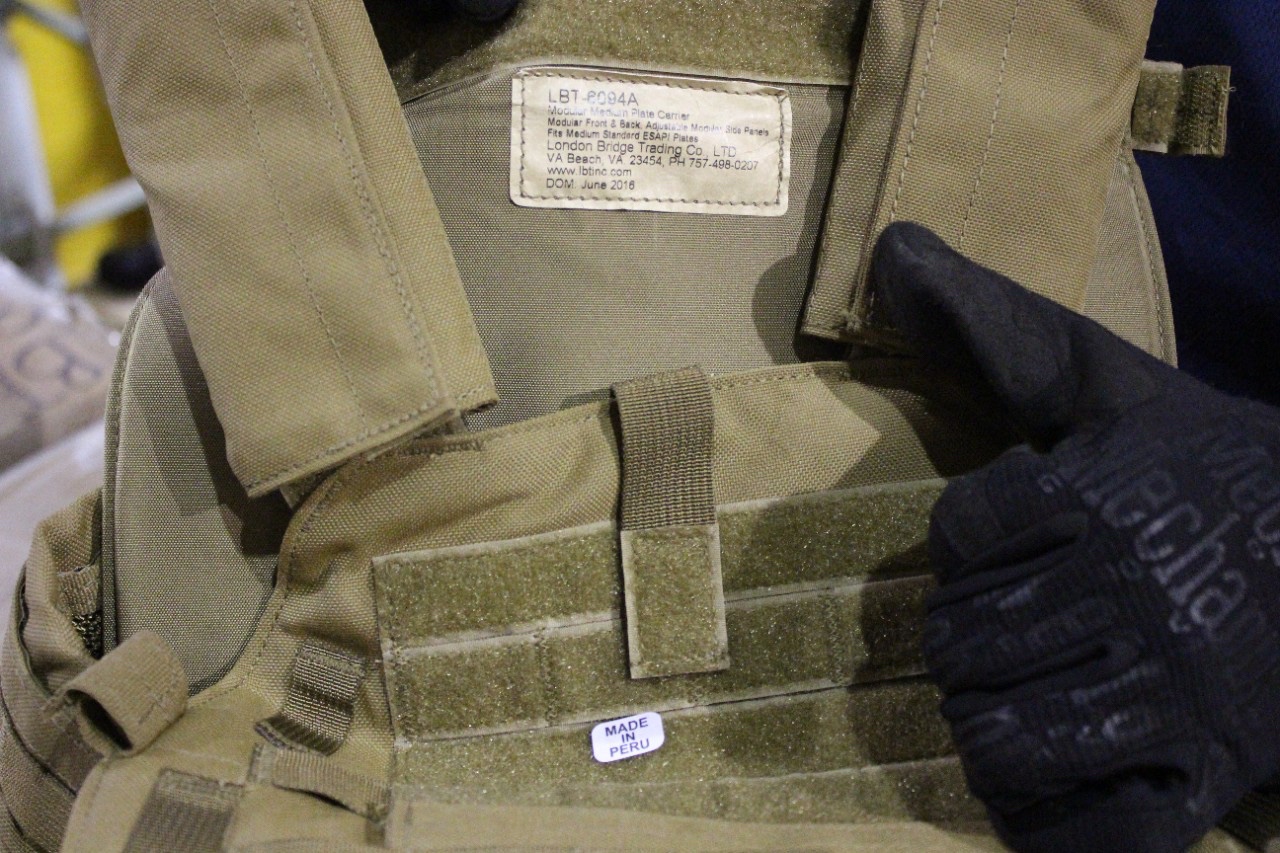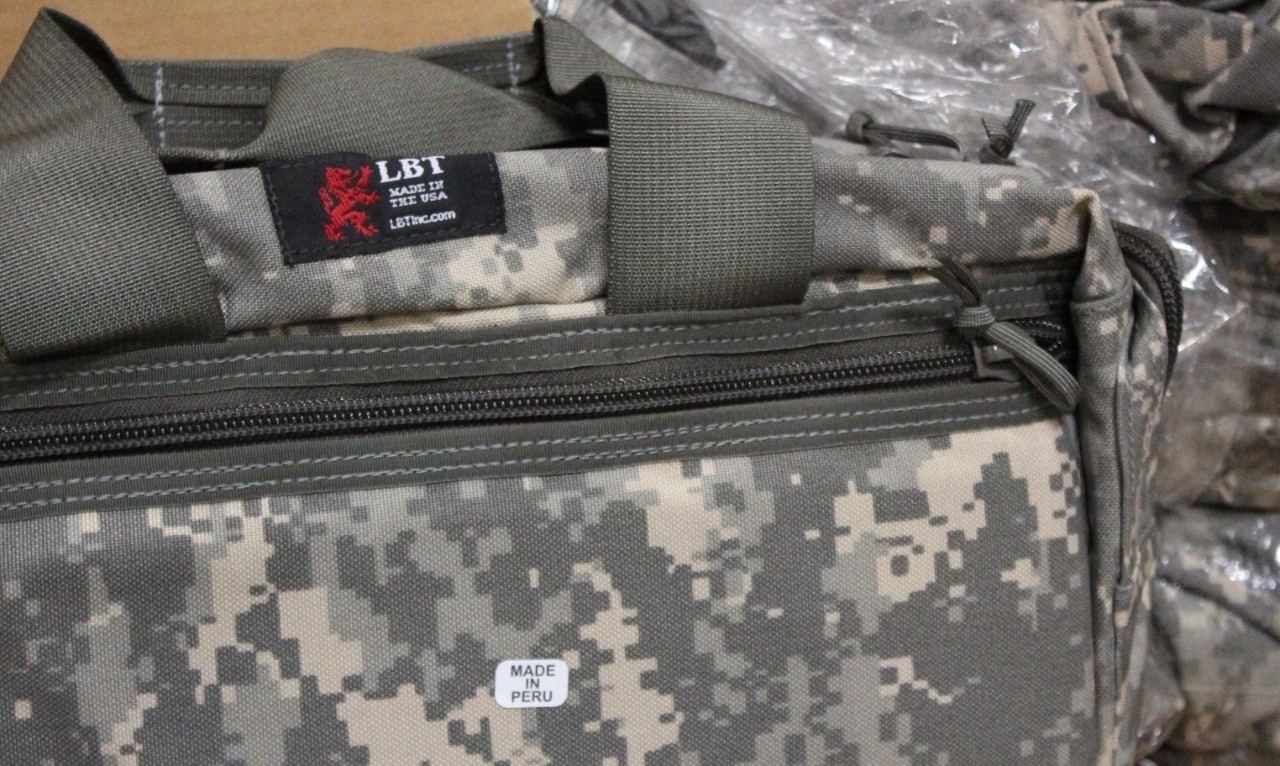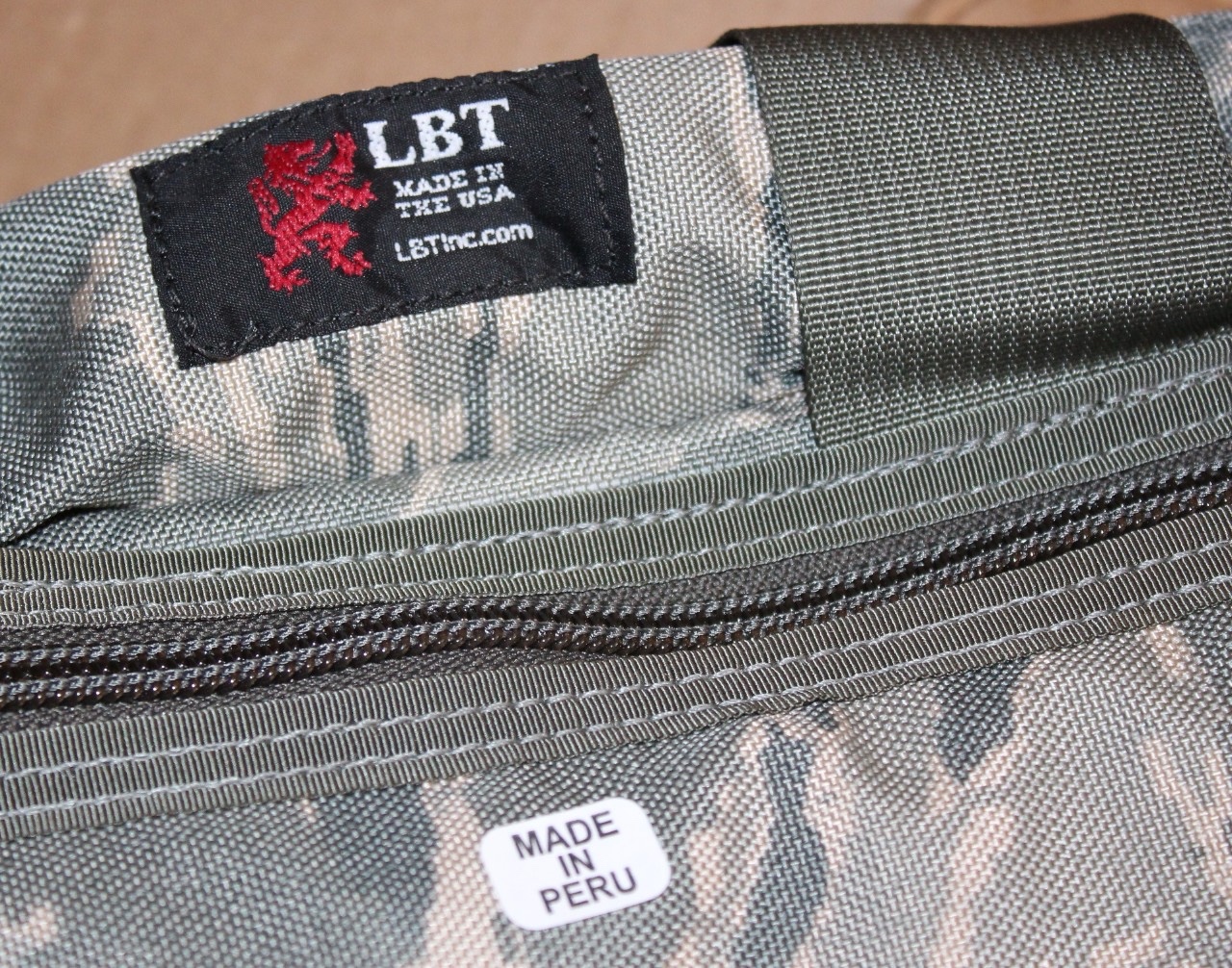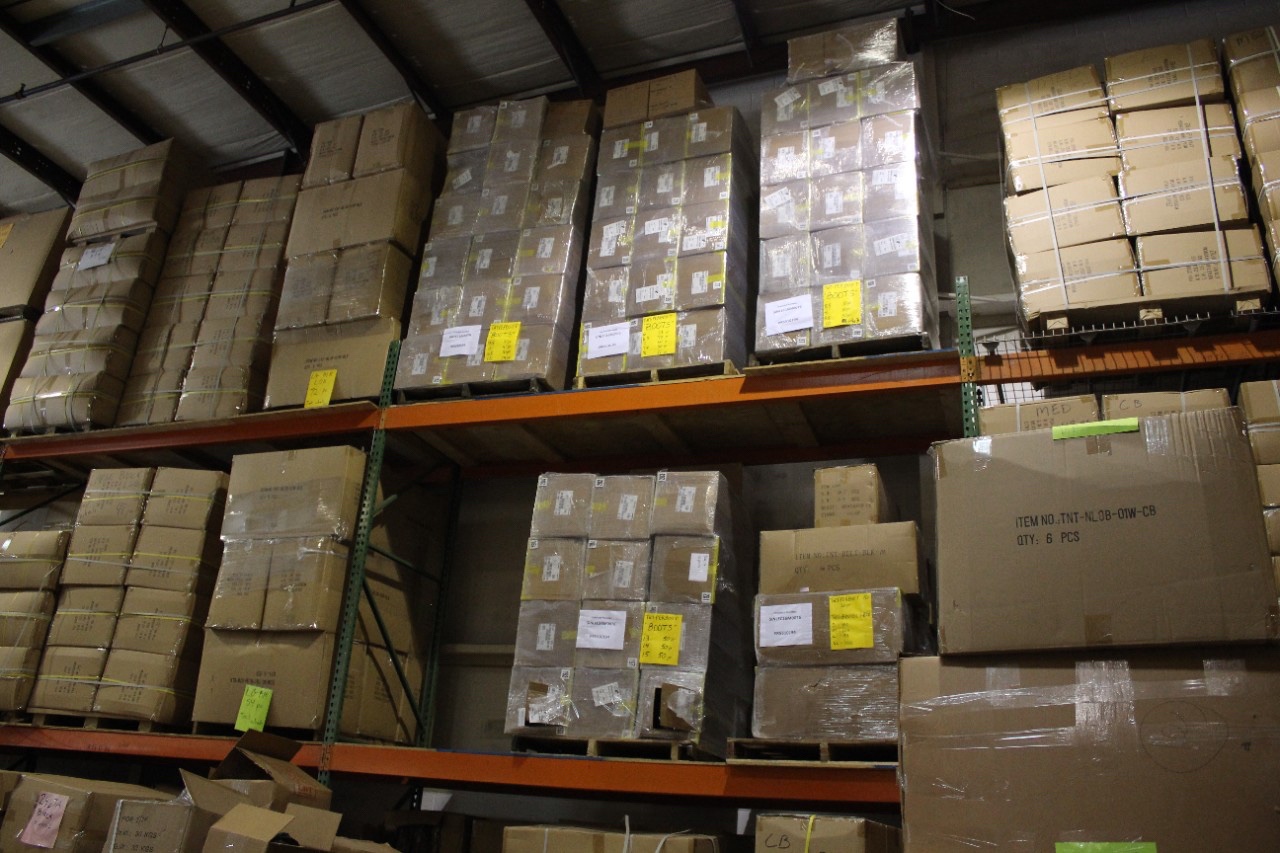HSI Norfolk Investigation into Virginia Tactical Equipment Company Uncovers Fraud, Yields More Than $2 Million in Violations of the Buy American Act




An HSI Norfolk investigation revealed that the Virginia-based tactical equipment company London Bridge Trading Company sold foreign-made goods marked as “Made in the USA.” Its customers included the U.S. government, which purchased the equipment for uniformed service members through the DLA.
NORFOLK, Va. — An investigation conducted by Homeland Security Investigations (HSI) Norfolk, the Defense Criminal Investigative Service’s Mid-Atlantic field office, the Army’s Criminal Investigation Division’s Major Procurement Fraud field office, the General Services Administration’s Office of Inspector General (GSA-OIG); and Defense Logistics Agency (DLA) into a Virginia tactical gear and equipment company resulted in a settlement worth more than $2 million.
The London Bridge Trading Company, Ltd. (LBT) of Virginia Beach agreed to pay nearly $2.1 million Nov. 20 in the U.S. District Court for the Southern District of Ohio to resolve False Claims Act allegations that it failed to comply with the requirements of the Buy American Act, Trade Agreements Act and Berry Amendment when selling textile-based products to the Department of Defense. The company entered the settlement with the United States and qui tam relator Ann Keating.
“The London Bridge Trading Company deliberately deceived their customers and the U.S. government into believing they were buying American made products, while selling them cheaper foreign merchandise,” said HSI Washington, D.C. Special Agent in Charge Derek W. Gordon. “Furthermore, LBT potentially put the lives of our military personnel at risk by selling our government inferior protective equipment produced overseas. HSI Washington, D.C. will continue to work with our partner law enforcement agencies to ensure anyone attempting to defraud our government will be held fully accountable for their actions.”
The investigation detailed that since at least 2008, LBT submitted false claims in connection with the sale of “American made” products that were actually manufactured in foreign countries, including Peru, Mexico and China. The company marketed its goods as “100% made in America” and replaced the original foreign manufacturers’ tags with tags that read “Made in USA.”
LBT also offered its products for sale to all federal agencies on a government-owned website, “GSA Advantage!”, which permits government agencies throughout the United States to purchase products from contracted vendors.
The United States, including through the Defense Logistics Agency’s supply center in Columbus, Ohio, purchased a variety of textile-based products from LBT, including clothing, armor, boots, belts, bags, rope, slings, backpacks and medical pouches. The settlement specifically addressed load-out bags purchased from LBT that violated the Trade Agreements Act and the Berry Amendment.
“We greatly appreciate the steadfast, thorough and collaborative work on this case by each of the federal agencies involved,” said U.S. Attorney Kenneth L. Parker. “This office takes very seriously the duty of government contractors to meet all of their obligations under government contracts and we will pursue anyone falsely certifying compliance with the Buy American Act.”
The civil settlement includes the resolution of claims brought by an employee of LBT under the qui tam provisions of the False Claims Act. These provisions allow a private party, known as a relator, to file an action on behalf of the United States and receive a portion of any recovery. Under the terms of the settlement agreement, the relator receives a share of the proceeds.
The relator in this case had a personal interest in the safety and security of the United States military. In 2004, her son was killed while serving in Iraq. The relator believes the scheme was a threat to the safety and integrity of U.S. military operations.
“We are very pleased with this resolution. This is a testament to the aggressive investigation we conducted, and now the public can see this.” said Andrew Johnson, special agent in charge of the Army’s Criminal Investigation Division’s Major Procurement Fraud field office. “Companies that do business with the government must comply with all of their obligations, and if they seek to circumvent the rules and regulations of what and how they supply our women and men in uniform, they must be held accountable for their actions.”
The Buy American Act was enacted in 1933 to protect U.S. manufacturing by creating a preference for domestic products when the federal government purchases supplies. The Berry Amendment requires certain items purchased by the Department of Defense to be 100% domestic in origin and mandates a higher level of domestic content than the Buy American Act. The Trade Agreements Act governs trade agreements between the United States and foreign countries and limits certain U.S. government procurement to U.S.-made products or products made in designated countries.
“GSA-OIG will continue to work with its investigative partners and the Department of Justice to protect the integrity of GSA’s Multiple Award Schedule program and hold accountable those who attempt to defraud the government,” said Special Agent in Charge Elisa Pellegrini with the General Services Administration’s Office of Inspector General.
This investigation was conducted with significant assistance from U.S. attorneys’ offices in the Southern District of Ohio and Eastern District of Virginia.
HSI is the principal investigative arm of the U.S. Department of Homeland Security (DHS), responsible for investigating transnational crime and threats, specifically those criminal organizations that exploit the global infrastructure through which international trade, travel and finance move. HSI’s workforce of more than 8,700 employees consists of more than 6,000 special agents assigned to 237 cities throughout the United States, and 93 overseas locations in 56 countries. HSI’s international presence represents DHS’ largest investigative law enforcement presence abroad and one of the largest international footprints in U.S. law enforcement.
Editor’s note: Although LBT has been a long-term advertiser on Soldier Systems Daily we were unaware of this activity and are particularly displeased that LBT did not disclose this issue from us, even as it was playing out in court. These aren’t mere allegations but rather, an admission of fact.
Hopefully, they will quickly institute measures to ensure that this sort of behavior is impossible in the future and make full restitution.
Update
I would like to provide an update. I have spoken with LBT about the situation and some issues have been clarified. I have asked them for a formal statement which I will share as soon as I receive it. The $2.1 million settlement with the US Attorney is over the sale of non-Berry compliant load out bags from 2014-2016 and nothing more, despite the content of this press release I shared from ICE. It is the conclusion of a situation which began in 2017 which was covered here:
https://soldiersystems.net/2017/04/27/lbt-inc-issues-statement-regarding-federal-investigation/
LBT responds at soldiersystems.net/2023/11/30/statement-form-lbt-inc-regarding-2-1-million-settlement-with-u-s-district-court-for-the-southern-district-of-ohio


Very unfortunate to hear – LBT gear, generally speaking, has always been of very high quality and their LBX line seemed to be pretty transparent about being a cheaper, foreign-made/sourced line. I wonder how much of this was negligence vs. malicious intent. Hearing that this goes back to 2008 is particularly sad as it goes far beyond any material shortage or supply chain issues that could be explained by the global pandemic.
I personally worked with a couple former employees of LBT in the past to organize and run some Group Buys on discontinued holsters and other gear. Great people to deal with and always seemed to be very eager to accommodate both commercial and larger-scale requests, all the way down the working with individuals on customization and repairs. The majority of the team I worked with has since departed the company, but aside from a slight preference to larger business opportunities, I never had a negative experience with them, at all!
Overall, $2M is likely a small slap on the wrist, but the bigger harm comes from the major blemish against the companies’ reputation. As Eric G stated – hopefully LBT can make restitution and bounce back better than before.
Curious to know if aside from the financial penalty, is LBT now precluded or limited in dealing with government agencies, temporarily or forever? I do not know their mix of commercial versus government sales, but if the latter is partially or completely foreclosed, does that mean the end of the company? I also wonder if LBT will now be required to notify commercial purchasers of the contraband products of their true origin and offer refunds or replacements? Other companies have done similar things and they have survived, e.g., Soffe with the 2012 Bangladesh warehouse fire, but reputations can be permanently damaged.
LBT has not been disbarred and continues to do business with the government.
Btw, this stems from sales of Loadout bags from 2014-2016.
Two things
1) Loadout bags? So it was one item, right or wrong (wrong, obviously), but the verbiage leads one to believe LBT was in some wild scheme where the entire org was full of fraudsters. The tone itself is an outright falsehood, and laughable once you know that tidbit.
2) Probably safe to assume all of the goods purchased by us on the B2C side are good to go and have no issues, again after learning that tidbit about loadout bags.
This doesn’t excuse LBTs ridiculous action here, but most people should temper their frustrations (slightly)
Legal violations aside, the hyperbole from the relator is ridiculous. Unless her son was in a firefight and the stitching on his plate carrier came loose and his plate fell off or something, the product being made overseas would have nothing to do with his death.
The case came down to the sale of non-Berry compliant load out bags. No PPE that I know of was involved in the investigation or settlement.
“The civil settlement includes the resolution of claims brought by an employee of LBT under the qui tam provisions of the False Claims Act. These provisions allow a private party, known as a relator, to file an action on behalf of the United States and receive a portion of any recovery. Under the terms of the settlement agreement, the relator receives a share of the proceeds.
The relator in this case had a personal interest in the safety and security of the United States military. In 2004, her son was killed while serving in Iraq. The relator believes the scheme was a threat to the safety and integrity of U.S. military operations.”
The death of her son is tragic and her allegations are what kicked it off, but not how it was settled. It was settled based on the sale of non-Berry compliant Loadout bags.
” These provisions allow a private party, known as a relator, to file an action on behalf of the United States and receive a portion of any recovery. ”
“The relator in this case had a personal interest in the safety and security of the United States military. In 2004, her son was killed while serving in Iraq. The relator believes the scheme was a threat to the safety and integrity of U.S. military operations.”
The point is that her being allowed to be a relator in this at all is dumb when her son’s death and nothing to do with the issue in the lawsuit.
I get where you’re coming from but that’s not how it works. If you’re able to bring a reasonable case of someone defrauding the government you may be able to be a relator, regardless of a personal stake in the matter.
It’s often an employee or former employee, rather than an end-user, for example.
Not a lawyer so here’s a google result, for more info: “Relators are often past or present employees, contractors, vendors, auditors, consultants, or associates of a defendant organization. But, because the FCA allows anyone claiming to have inside knowledge of false claims or statements being submitted to the government to file a qui tam suit, relators also can be competitors or others in the marketplace.”
“And replaced the original foreign manufacturers’ tags with tags that read “Made in USA.”
This extends far beyond smaller companies like LBT. They do the same thing with computer chips for all manner of big-ticket defense items, and when I say “they” I mean major companies much bigger than LBT…feel free to guess who.
Sad to see such a legendary brand decided to cut corner. Hope they learn their lesson and stick with the berries moving forward. This should definitely serves as a warning to other gear manufacturers.
This is disappointing, I ordered a fair amount of gear the past week. Before all this so, fool me once shame on you…
“War Dogs 2, coming spring if 2024”
Good on you for dropping them, Eric.
Now let’s see if their dealers possess the same level of integrity.
Odd that they’ve limited this to the loadout bags but the first image they posted was a plate carrier. I saw the note from LBT as well as the additional editor’s note, wonder if they’re really out of the woods yet?
Also curious to see if there will be any blowback on their prime vendor and government resale partner(s) if they supplied non-Berry gear to DLA/MIL customers.
Thanks for keeping us informed Eric.
Well, as often as not, the company response to all this can be telling. The way they neglected to tell Eric about this with their banners on his website; the way they blew it all off as a big nothing burger, concerning bags only, when I can plainly see a “made in Peru” tag on a plate carrier. The two sides of the story are so far apart methinks there is more to it.
But as the man said, this might be more common than we care to think about; not just bags but electronics and so forth. So it’s not just LBT doing it; a whistle-blower merely brought this example to light. Of course they are all now busy papering their asses with exemptions and so forth.
Pure speculation on my part here. I have no inside information.
Didn’t they have a previous subsidiary called True North or something similar? It was based out of South America and made their scrim boonie hats and used their tactical gear pattterns. This would seem to fit the narrative
Sad to hear. They always made great stuff.
A snake in the grass may shed its skin, but it is still a snake!!
Around 2010 I ordered a bunch of equipment (mostly packs) on the website. Half of them arrived without tags. I emailed them as to why the packs had no tag and I got a non existent answer. They just sent me a couple of lion patches with Velcro as a remedy. As to why LBT product were leaving Virginia Beach without QC and tags certainly raised some questions for me. Back in the old days I used to see a lot of orange inspection tags on the pieces of gear and not to mention the quality of the fabric was a LOT different. I am not surprised. Kinda just soured me from buying their product ever again.